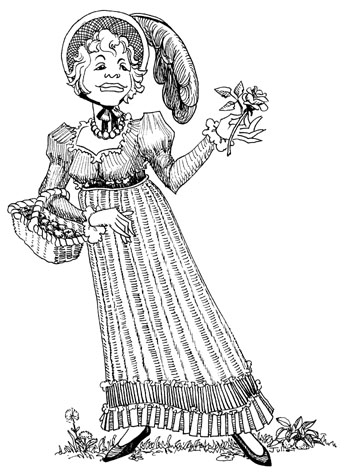|
Augusta Hawkins was neither handsome, clever, nor rich, and had lived five-and-twenty years in the world with a good deal to vex and distress her. Her father and mother had died when she was very young, and the fortune divided between Augusta and her older sister Selina, was so moderate, after her father’s dry-goods establishment in Bristol was sold, that it was plain the young women could reasonably look forward to no brilliant or distinguished destiny. Their home with an uncle, an attorney’s clerk, was not the home of comfort and plenty: the interest on the girls’ portions formed an important part of the household income, and the uncle was a mean, narrow-minded, illiterate man, whose home in the very heart of Bristol was not one calculated to give a young woman any advantage in society.
With the luck that defies prediction in matrimonial affairs, Selina Hawkins, with only so many thousands of pounds as would always be called ten, attracted, in her first season at Bath, the attentions of a young man both rich and liberal, and was rapidly and triumphantly married, while Augusta’s lot in life remained to be fixed. It was to be hoped that Selina’s triumph would be to her sister’s advantage, in being the means of introducing her to other rich young men, but this did not occur: Maple Grove, Mr. Suckling’s seat, was certainly all that was luxurious and comfortable, far superior to anything Augusta had ever seen in her straitened Bristol life; but it was in a location very retired, in a small community (as was reflected in the size of the school), so that among all the families the Sucklings visited, there was no eligible young man worthy of the name. Augusta had, to be sure, a sufficiency to live upon; and she was a welcome guest at Maple Grove, as often as she cared to be there; which, as the place was to her a paradise of peace and plenty, in comparison with her Bristol home, was very often indeed. Maple Grove formed her tastes probably more than it should; and Selina, anxious for her sister, began to give her many hints that it would be well for her to be mistress of such an establishment of her own. As Augusta fully agreed with this, there was nothing for her to do, but to visit Bath, as often as might be. Her uncle, to be sure, never went into society, and would not make a figure in any circle in Bath that could do his niece any good. Selina could not often be spared from her duties at Maple Grove; and so Augusta was forced into a kind of half-and-half Bath life, making shift with friends married and single, who took young lady guests, and provided the necessary chaperonage to the Rooms and the various private dances and card parties that were so important to a young woman whose object was matrimony. Eight long seasons did Augusta spend in Bath, without attracting any wished-for Mr. Suckling; and she was in truth growing desperate, if a young lady may ever be said to be desperate, while Selina had given up her chances altogether. “That girl,” she declared, “will never find a husband; she is too nice. I will tell you what, Augusta, you will end as an old maid, indeed you will. You are always very welcome to make your home at Maple Grove, to be sure – very welcome – but I should think you would be too proud, and would try a little harder to do something for yourself.” Three months after Selina uttered these words, Augusta had met a young man who was as anxious to marry her as she could wish to be married; and one month from that date, she was Mrs. Philip Elton, being carried in the ecstasy of her bridal achievement, from her meagre Bath rooms to a new home, a respectable and prosperous vicarage in the Surry(*) village of Highbury.
* The correct spelling is Surrey. Surry is the spelling Austen used in Emma which seems appropriate for this work.
|


